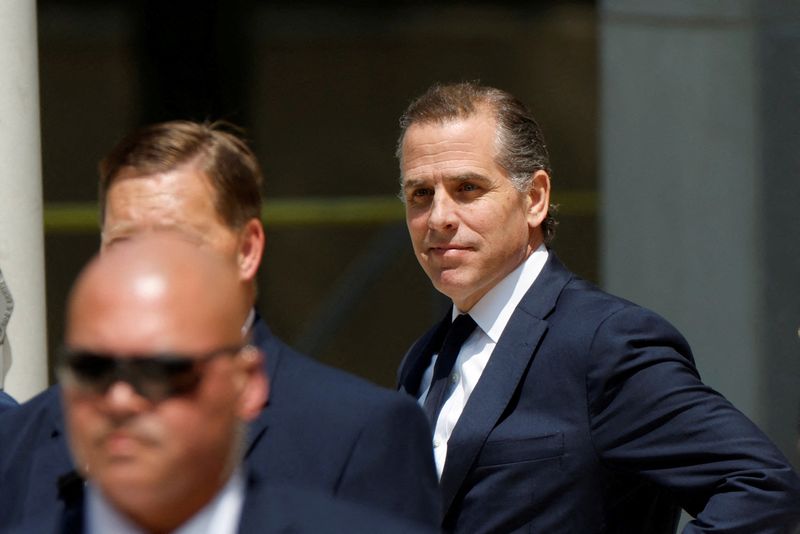By Andrew Goudsward and Nate Raymond
WASHINGTON (Reuters) - Hunter Biden, President Joe Biden's son, may get a legal boost from an unlikely source - the conservative-majority U.S. Supreme Court - when he contests his indictment on firearms-related charges, thanks to the reasoning expressed by the justices in their most recent expansion of gun rights.
Hunter Biden, 53, is expected to plead not guilty on Tuesday in Delaware to unlawfully possessing a gun as an illegal drug user and lying about his drug use on a background check form when he bought a Colt Cobra revolver in 2018.
The Supreme Court's June 2022 ruling in a case called New York State Rifle & Pistol Association Inc. v. Bruen set a new standard to apply in judging the legality of gun restrictions imposed by governments - declaring that they must be consistent with the U.S. "historical tradition of firearm regulation."
The indictment was secured in September by Special Counsel David Weiss after a plea agreement between Hunter Biden and prosecutors collapsed in August. Abbe Lowell, Biden's defense attorney, has publicly suggested he may challenge at least some of it based on the Bruen decision.
The younger Biden, who has acknowledged past cocaine use, is expected to ask U.S. District Judge Maryellen Noreika to dismiss the possession charge by arguing that the federal law banning illegal drug users from owning guns has no historical counterpart and violates his right "to keep and bear arms" under the Constitution's Second Amendment, according to legal experts.
Lowell declined comment when asked by Reuters about the Bruen ruling's implications in this case.
But in a public statement on the day of the indictment, Lowell said, "We believe these charges are barred by the agreement the prosecutors made with Mr. Biden, the recent rulings by several federal courts that this statute is unconstitutional, and the facts that he did not violate that law, and we plan to demonstrate all of that in court."
'SOME IRONY'
Democrats typically favor gun restrictions while Republicans oppose them. Any bid by a Democratic president's son to challenge a federal firearms law like the one involved in this case would scramble these usual political dynamics.
The president, an advocate of gun restrictions in a nation facing persistent firearms violence, cited a spate of mass shootings in saying after the Bruen ruling that the decision should "deeply trouble us all." Many Republican lawmakers who have relentlessly criticized Hunter Biden lauded the Bruen decision.
"There would be some irony if a case greatly expanding Second Amendment rights is titled Biden v. United States," UCLA constitutional law professor Adam Winkler said.
Cases now being litigated will help determine how far the Bruen ruling lets courts go in invalidating gun laws.
"The Bruen decision has created a great deal of uncertainty in terms of which guns laws are constitutional and which may not be," said Andrew Willinger, executive director of Duke University's Center for Firearms Law.
One U.S. appeals court already has concluded that the drug-related statute at issue in Biden's case may be unconstitutional in some circumstances in light of the Bruen precedent. In a case involving a marijuana user, the New Orleans-based 5th U.S. Circuit Court of Appeals in August found that U.S. history and tradition "does not justify disarming a sober citizen based exclusively on his past drug usage."
Hunter Biden's lawyers may cite that 5th Circuit ruling in challenging the drug-related possession count.
Federal prosecutors are likely to argue, as they have in other cases, that 19th century restrictions on intoxicated people possessing guns and laws disarming groups deemed dangerous give historical grounding to the charge against Hunter Biden.
The Atlanta-based 11th U.S. Circuit Court of Appeals is set on Thursday to hear a challenge by medical marijuana users in Florida to the federal ban on illegal drug users possessing guns.
Even if Hunter Biden gets the possession charge dismissed, there is still the matter of the two counts accusing him of false statements on the background check form. Those counts, according to experts, may be harder to dislodge because the charge is similar to others unrelated to guns that criminalize lying to the U.S. government on significant matters.
The Supreme Court is set to rule again on gun regulation in a Texas case to be argued on Nov. 7 involving whether people under domestic violence restraining orders can be barred from gun possession. That decision, expected by the end of June, may clarify the level of danger a person must pose to be barred from having guns.

In that case, the 5th Circuit applied the Bruen ruling in concluding that banning people under such restraining orders from owning firearms was "an outlier that our ancestors would never have accepted."
"I think that it could potentially have a huge influence on a case like Biden's," Southern Methodist University law professor Eric Ruben said of the Supreme Court's eventual ruling in the Texas case.